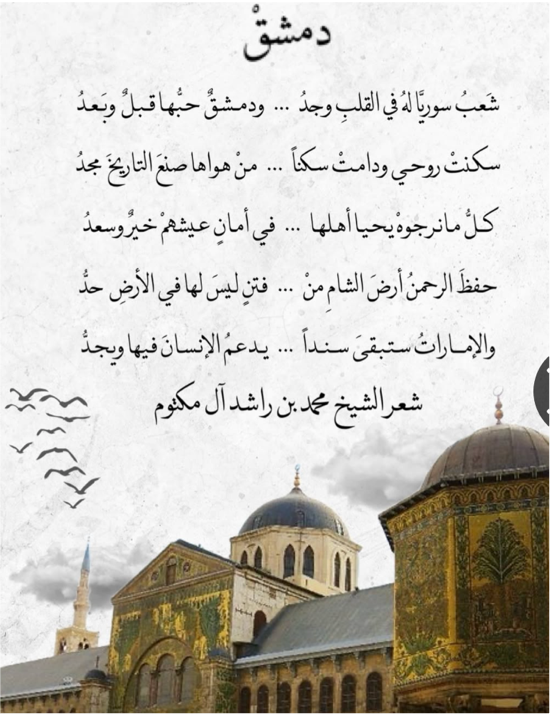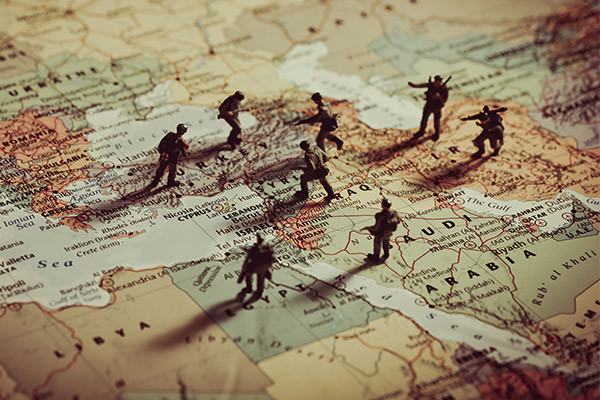Tough questions in the future of Syrian relations
Syria was liberated on December 8, 2024. On this date, the Syrians were liberated from a regime that used all kinds of torture against them, the Arabs were liberated from a constant threat to the security and stability of the region, and the Europeans were liberated from a tool used by the extreme right to reach power. This moment of liberation requires a leap of faith from the Syrians to believe in each other, for the Arabs to trust that they are able to positively influence the future of the Syrian state, and for regional and international players to move to a new phase of relations based on cooperation and respect for sovereignty.

- by Rasha Al Joundy ,
- Friday, 20th December, 2024
December the 8th 2024, when Basha al-Assad’s regime fell, it was a unique moment of liberation, on the humanitarian, political, and security level in the Arab region. While the Syrians were liberated from an oppressive regime that used every tool of torture and fear against them, the Arabs were liberated from his policies which threatened their security, starting from drug and weapon smuggling to spreading sectarianism and cooperating with hostile countries against the Arabs.
The Europeans were liberated with Syrians’ liberation. Europe has a population of about 450 million and hosts about a million and a half Syrian refugees who - despite their small number compared to the population and size of the European continent - were used to incite the rise of the far right parties in Europe, which makes the liberation in Damascus a parallel liberation for Europeans from the far right by stopping the wave of migration and the regime that caused it.
The recipe for success to maintain this positive momentum is to have a leap of faith that the outcome in Syria will definitely be peace and prosperity for all. Cautious policies are not the answer, because “cautious” means doubt, and doubt leads to half measures and half policies. While in reality, the powers that controlled the military and political scene in Syria during the last decade didn’t do it with doubt or half policies, and they may return to seek control, or to sabotage by threatening the security of civil institutions and frightening communities during a very delicate and strategic phase of transition.
First: Syria internal affairs
Regarding the presence of Hay’at Tahrir al-Sham as the leader of the transitional phase and its “al-Qaeda” background, it is a legitimate concern, but their actions so far indicate that an internal, practical and intellectual cleansing had taken place within the organization, starting with their leader Ahmed al-Sharaa (formerly al-Julani) and ending with the individuals deployed to maintain security in the streets of Syria from Idlib to Tartous, passing through Damascus, the soldiers were surprisingly successful in preventing chaos and restoring normal life very fast in the streets.
The initial assessment from Ahmed al-Sharaa’s interviews on CNN and BBC is that he does not intend to take Syria as spoils for his military victory, and he pursues a transfer of power along with a new constitution, real elections for the first time in modern Syrian history. Alsharaa declared he intend to hand over power in March to a transitional government, a step that will not be easy for him or for those who fought with him for a decade. We must acknowledge the need to support his decision and to focus on the easiest and shortest possible way to reach elections. It is also important to be careful not to try to call for the exclusion of a group that carried out the liberation, as new Syria should not tolerate the exclusion of any party by any party merely for rejecting its appearances or its previous or current beliefs. Peaceful living code means only to prevent the imposition of beliefs on others and nothing more.
There are proposals to activate 1950 constitution and proposals to establish a constituent assembly to draft an interim constitution leading to the elections. The problem with the 1950 constitution is that it dates more than seventy years back and establishing an assembly to draft a constitution will raise questions about the figures who have sufficient legitimacy outside the context of elections to write a constitution, even if it will be put to a referendum later, and this is the critical current debate. How to move to an interim constitution and a transitional governing body, and the truth is that there may not be one correct answer, all solutions are up for discussion, which is a healthy practice given the lack of political activism in Syria throughout the previous decades. The bottom-line is, whatever road the Syrians take will not be the end but the beginning, change is the goal, the practice and the road towards a state of law, equality, justice and a decent life. I believe that focusing on these goals is what is important, while how to achieve them may be through all means not one. It is possible to adopt 1950 constitution and yet start the process of writing a new constitution by pursuing the help of Syrian constitutional law experts inside and outside Syria to ensure diversity and different legal backgrounds, and most importantly, requesting the opinion of former detainees, both male and female, and consulting civil society activists since they are for now the best representative of Syrian society.
All Syrians dream of a homeland free of corruption, nepotism, free of humiliation based on classes, sects or regions, and free of subordination to any state or agenda, and free of hostility based on an individual or family interests, and no one will accept less, and no party will be able to manage the Syrians by changing their identity, Iran and Hezbollah failed trying, and others will fail as well.
Second: Syria foreign relations
Syria’s relationship with its Arab neighbors was strengthened by Syrians during the mass exit towards Arab and Gulf countries since 2011. Notably, one of the first demands Syrians made to their future leadership, spread on social media was to build a tower like Burj Khalifa in the Emirates, and to extend bridges, roads, metros and trains like the UAE, and to seek help from Saudi Arabia and Qatar to provide energy and electricity, after years of total darkness in Syria.
All Syrians living abroad received congratulations from their Arab friends, and on the issue of reestablishing relations with Assad regime or the demands from many Syrians, some Arab and Western countries in secret or in public to lift the sanctions imposed on the regime, aimed to help Syrians to enhance their daily lives at a time when there was no possibility of such breakthrough that occurred on December 8th, this policy was in no way related to respect or appreciation for a murderous regime known for how many crimes it committed against its own people, which makes the joy of victory for all of us and an end of the crisis Assad caused due to his stubbornness and rejection of the political settlements that were offered to him repeatedly.
Bashar al-Assad was a treacherous person and he betrayed everyone who supported him, or was killed for his sake, and no one from the Arabs or the West regrets his end.
Turkey, the neighboring country that received Syrians in large numbers, granted many of them its citizenship, while President Erdogan's policy led to domestic political consequences for the Justice and Development Party, which lead to Turkey's participation in negotiations to reestablish relations with Bashar al-Assad’s regime, Turkey also was faced with evasion and manipulation from Assad. Today, Turkey plays a critical role providing important services inside Syria and has longstanding relations with the Syrian opposition military forces. It is expected that Syrian-Turkish relations, as well as Qatari-Syrian relations, will have an advantage related to the continuation of political and humanitarian support they provided the opposition, many of the Syrian opposition live in Doha and Istanbul. New Syria needs these relations as well as it needs the relations with all Arab and regional countries without exception. Syria appreciates and needs the relationship with Turkey and its continued political economic cooperation and support, which highlights the importance of resolving the crisis of Kurdish military forces’ threats to Turkey and to the Syrian people inside Syrian territory. This is of strategic importance to end the era of military operations and any militia affiliated with any party outside the Syrian state. This includes dealing with the SDF and any threat from ISIS as well.
Iran and Russia, the relationship with these two countries requires political wisdom and understanding of the Syrian citizens feelings. There is no doubt that the regime has fallen, but Russia also did not decide to bomb its way out of the dilemma as it did in the Syrian cities’ destruction of 2015, nor did Iran decided to send its forces to defend Assad regime during its collapse, while Hezbollah was not able to take such a step due to its agreement with Israel and its need to preserve its positions and what remains of its weapons in Lebanon. These factors must be taken into consideration, regardless of the core strategic reasons related to the priority of the Ukraine-war or President Trump’s approaching arrival to the White House. The result is that non-intervention led to the liberation of Syria from the Assad regime without bloodshed.
Iran has lost significant part of its power in Lebanon, then lost in Syria after the regime fall, but for Iran to overcome its political and economic challenges it needs the Arab and Gulf states, not Syria. Iran adopting a policy of respectful relations with its neighboring Arab countries is a policy worthy of support, while its integration into the international community depends on reaching an agreement with the Americans, an agreement that serves stability in the Middle East, turning the page from a destructive era in the Arab region. First inline of such destruction was Lebanon and Syria, and continuing threats to the Gulf states’ security by spreading sectarianism, conflict and rifts in Arab societies. A new respectful relation with Iran will be in everyone’s interest including stability in Syria.
Russia, as distant power coming to the Middle East, was expected to leave Syria sooner or later. Furthermore, it didn’t deploy ground forces, but rather stationed in military bases and ports from which it began to withdraw after Assad’s fall, therefore Russia‘s presence did not pose a strategic threat on the long term, unlike the sectarian militias that represented the most prominent threat to the sovereignty of the Syrian state.
It is expected that managing relations with Russia will be based on pragmatism, but it is not expected to return to its former status for obvious reasons related to the role of Russian air force bombing Syrian cities. In any case, Syria does not represent a strategic partner or ally for Russia, while its relations with countries such as the UAE and Saudi Arabia are more important due to many common interests such as OPEC+ agreement, mediation in the Ukrainian crisis to exchange prisoners, besides other economic and political files.
Forgiveness, even in relations between countries, takes time, and Europe after World War II with its death camps are a living example.
Who do the Syrians count on?
Fundamentally, The Syrians count on their relationship with the Arab countries, they are the partners on the road to legitimate new Syrian state, without their support, the transitional phase will face more threats and risks than the ones already there to face and manage, diplomatically and economically.
There is no doubt that other countries’ experience changing long established power remain frightening which explains the diplomatic cautiousness in the Arab capitals, and the reliance on the international community’s position to support the transition in Syria. It is important to emphasize that this is a stage of building foundations, but in the case of relations with the Arab countries it is ready to start from a solid foundation, especially countries such as Qatar, the United Arab Emirates, Saudi Arabia, Egypt and other Arab countries that received the Syrians, supported their journey and got to know them better during the last decade that witnessed a mass exodus out from the Syrian homeland.
The international community, and the United States in particular, did not directly contribute to a rapid overthrow of the regime in a way that would spare the Syrians from long suffering. The redline presented by former President Obama is still stuck in the memory of millions of Syrians, along with the scenes of the chemical attacks in Ghouta. However, two important issues resulted from this suffering. The first is that victory was not achieved in eleven days that ended with the liberation of Syrian cities. Rather, victory was achieved through the suffering of millions of detainees, displaced people, starvation, and continuous fight of Syrian heroes. This means that the present and the future are very precious, and the price for victory was blood and lost youth and will not be allowed to be wasted, meaning failure is not a choice.
The second issue is related to the sanctions that contributed to weakening the regime and depriving it from its economic capabilities along with its ability to maintain its relationship with its allies. These sanctions, the Syrians hated witnessing the suffering of their compatriots, Syrians suffered from these sanctions not Assad’s family or those close to them and this is a fact. Nevertheless, sanctions contributed to the fall of the regime but now they must fall with it without delay. Because economy is the pillar of stability and economic relations are the pillar of diplomatic relations, and all of this requires a leap of faith from the Arab countries to push the wheel out of the previous Assad-era and contribute to accelerating the procedures for lifting the sanctions.
It is important that the current and future leadership in Damascus to repeatedly emphasize that there will be no place for foreign agendas in Syria, or for exporting any ideas, or militias to any country. And to also emphasize that the focus will only be on building Syria. This is a cornerstone in establishing healthy respectful diplomatic relations with other countries.
Syrians are counting on their Arab family and more joyful news of reopening their diplomatic missions in Damascus after the comeback of Qatar’s embassy closed since 2011. Syrians wait for a summer of return, not only of Syrians but also of Arab visitors.

Rasha Al Joundy
Research Supervisor
Read More
Areas of Expertise
- Expert in the Gulf region politics,
- Security and internal affairs and has been working on the GCC region since 2011.
Education
- Master’s degree in International Relations and World Order at Leicester University (UK 2016).
- Graduated from the Faculty of Law – University of Damascus in Syria in 2006
Bio
completed her master’s degree in International Relations and World Order at Leicester University (UK 2016). She graduated from the Faculty of Law – University of Damascus in Syria in 2006, and trained as a lawyer to register at Damascus bar association. She is an expert in the Gulf region politics, security and internal affairs and has been working on this region since 2011. Rasha Currently work as a senior researcher for Gulf affairs and supervise the training program at Dubai Pubic Policy Research Centre.

